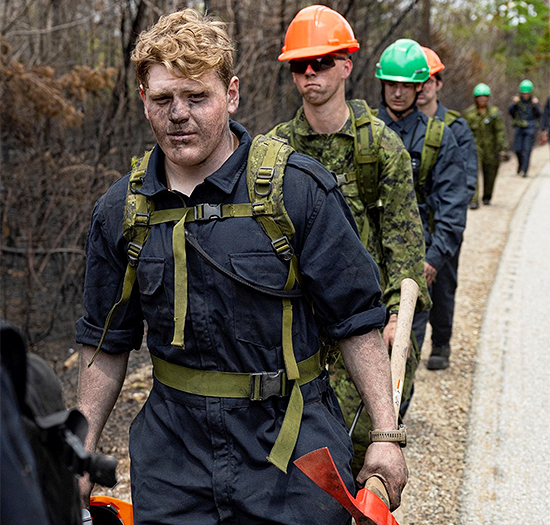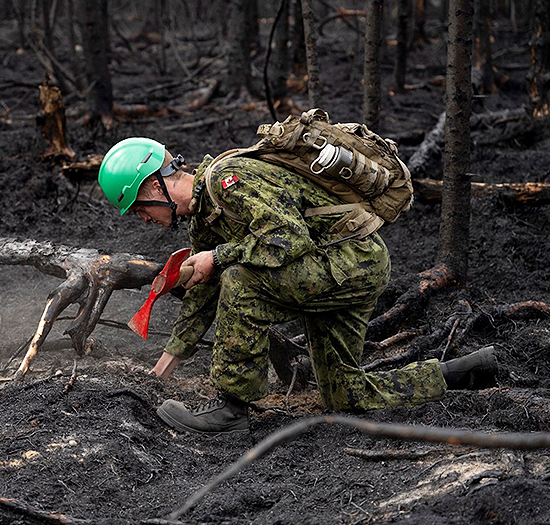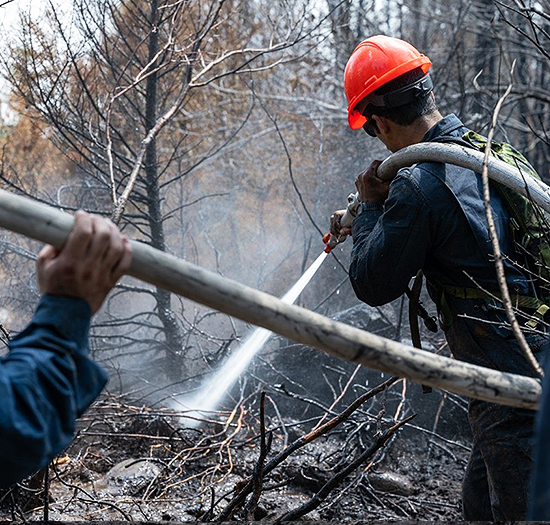The Second Battalion, The Royal Canadian Regiment, responds to the wildfire crisis in Nova Scotia
July 5, 2023 – Defence Stories
By: Captain Lance Wade, Op LENTUS PAO
In late May of 2023, Nova Scotia saw the beginning of an unprecedented wildfire season, one that led to the largest wildfire in the recorded history of Shelburne County. The situation was dire, and evacuation orders were issued, leaving 18,000 residents displaced. The province submitted a Request For Assistance (RFA) to Public Safety Canada, asking for military support, and the Second Battalion, The Royal Canadian Regiment (2 RCR), part of Joint Task Force Atlantic’s Immediate Response Unit (IRU), answered that call.
For 2 RCR, this was unfamiliar territory. While these situations are more common in Alberta and British Columbia, the East Coast has never seen fires of this magnitude. 2 RCR was mobilized to help lighten the load and provide relief to the many first responders battling the scorched areas in Shelburne County. The IRU Commander, Major David von Neppel, noted that “they [the firefighters] are only able to work for 14 days before they need to take a break. As they time out, our military personnel-turned-firefighters can fill that gap,”
Operating in this extreme environment brought with it many challenges, with the intense heat magnified accompanied by black soot and a distinct lack of shade. The terrain was difficult to navigate, the hours were long, and the job was physically demanding. However, the IRU was determined to provide relief to the firefighters who had been battling the flames for weeks and provide piece of mind to those residents grappling with their new reality.
The IRU were trained to seek out and extinguish a hidden threat: hotspots. Hotspot detection uses a variety of methods, such as the smell of burning brush, scanning for smoke, digging, and touching hot areas that have the potential to reignite under debris. The IRU put their new training to the test, using shovels, pulaskies, hoses, and pumps; these determined firefighters managed to locate 20 hotspots and cleared a linear distance of 68 kilometres (11.5 sq kms) during their firefighting efforts.
“We are providing training, to show them [IRU] what to look for and to answer questions and to supervise, so we can get this job done quicker,” said forestry technician Glenn Wallace, from the NS Department of Natural Resources and Renewables.
The members of 2 RCR want to thank and to express their gratitude to the community of Shelburne for their warm hospitality throughout this domestic operation. They also extend their well wishes to the brave Nova Scotians who are dealing with catastrophe and hope for a speedy recovery to the affected areas. The strength and bravery of the community served as a source of determination and resolve for 2 RCR.

Caption
Members from Joint Task Force Atlantic’s Immediate Response Unit conduct Type III wildland firefighting under Operation LENTUS 23-02 in Shelburne County, Nova Scotia, on June 10, 2023. The Immediate Response Unit, made up of soldiers from 2nd Battalion, The Royal Canadian Regiment, are in Nova Scotia following a Request For Assistance to provide support to wildfire response efforts in the Province.
Photo: Warrant Officer James Roberge, 5th Canadian Division Public Affairs

Caption
Members from Joint Task Force Atlantic’s Immediate Response Unit conduct Type III wildland firefighting under Operation LENTUS 23-02 in Shelburne County, Nova Scotia, on June 10, 2023. The Immediate Response Unit, made up of soldiers from 2nd Battalion, The Royal Canadian Regiment, are in Nova Scotia following a Request For Assistance to provide support to wildfire response efforts in the Province.
Photo: Warrant Officer James Roberge, 5th Canadian Division Public Affairs

Caption
Members from Joint Task Force Atlantic’s Immediate Response Unit conduct Type III wildland firefighting under Operation LENTUS 23-02 in Shelburne County, Nova Scotia, on June 10, 2023. The Immediate Response Unit, made up of soldiers from 2nd Battalion, The Royal Canadian Regiment, are in Nova Scotia following a Request For Assistance to provide support to wildfire response efforts in the Province.
Photo: Warrant Officer James Roberge, 5th Canadian Division Public Affairs